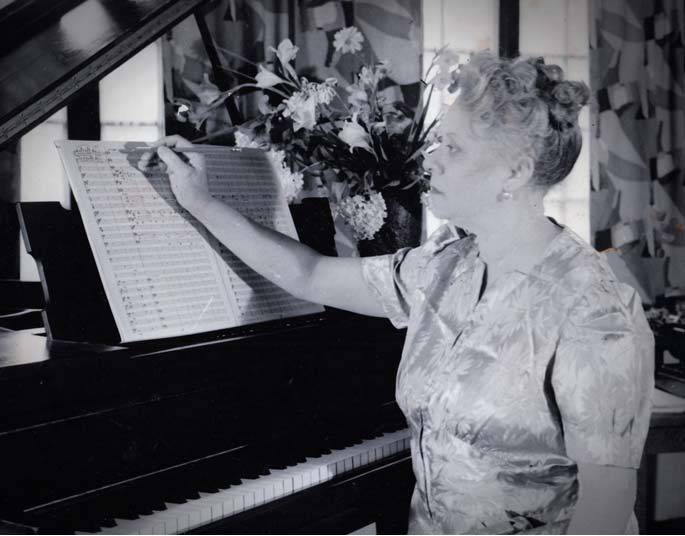The historic importance of Florence Price (1887–1953), as the first African American woman to have a Symphony performed by a major orchestra, has been recognized. However, while she had some success in her lifetime, after she died very little of her music remained the performing repertoire. A few of her songs were known — after all she was championed by Marian Anderson — but her orchestral music was unknown until the 2001 recording by The Women’s Philharmonic.
Recently, progress has been made: two of her symphonies have been published, and conductor Mei Ann Chen has taken up Florence Price, performing her with the Chicago Symphony, the Chicago Sinfonietta, the San Diego Symphony, as we noted in 2013, and then last fall with the Alabama Symphony. And a room was just dedicated to her at the Berklee College of music.
But a major breakthrough has taken place at the University of Arkansas. Apparently a great deal of Price’s music was simply abandoned after she died, and it was (amazingly) discovered in the Chicago house where she had lived — the house itself was also abandoned. Fortunately, these materials wound up in the University of Arkansas Special Collections (which already had a major collection of Price materials), and the University just sponsored a significant festival which included many world premieres of this newly found music. The program for the festival is listed here with a more detailed version in this PDF document.
In 2011 the University of Arkansas’ Special Collections library acquired a number of her scores, photos and other documents that had been lost for decades in the attic of an abandoned home in the Chicago area. This included music which has either never been performed or has not been performed for at least 60 years. A number of these newly recovered songs, piano pieces, chamber works, and her first orchestral composition, “Ethiopia’s Shadow in America,” will be performed by guest performers and faculty and students from the University of Arkansas throughout the festival.
So many works by women have been lost to dumpsters and trash bins, and it is quite miraculous that these works by Florence Price would be recovered all these years after her death. Here Prof. Rae Linda Brown (Assoc. Provost at Loyola Marymount University) explains what the new discoveries mean for our understanding of Florence Price, and what it meant to be a composer who was a woman, black, and American in the mid-20th century. Astoundingly, the discovery includes two symphonies and two concertos that were previously believed to be lost (!!!)
“Performance today” — on PRI, Feb. 26, 2015, features Price and the Arkansas Festival in their second hour, so you get the wonderful opportunity to hear a string quartet by Price, from 1929, in what is believed to be its world premiere. The performance of the quartet begins at 10:12. The first movement impresses me as a tone poem: at times evocative, moody, playful, and atmospheric, expressed in a seamless flow. It is played with great warmth and sensitivity by the Northwest Arkansas String Quartet: Er-Gene Kahng, violin; Ryan Cockerham, violin; Tazonio Anderson, viola; Patrick Bellah, cello. The second movement is a heartrending spiritual type of melody (Andante moderato) that frames a playful dance section (Allegretto). You can also watch a video of the last section of the second movement; it is very beautiful to watch! And Prof. James Greeson, of the Univ. of Arkansas, has made six other performances from the festival available on his Vimeo Page (thank you!). These include the Andante from Price’s “Ethiopia’s Shadow in America” with the Univ. of Arkansas Symphony conducted by Dr. Robert Mueller.
I am sorry I missed the Festival, but thank you to the Univ. of Arkansas for organizing it, and for preserving and making available these remarkable discoveries about a composer who we can now begin to appreciate more completely.

